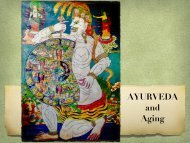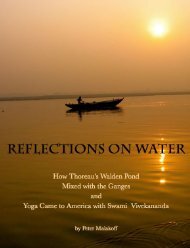How Thoreau's Walden Pond Mixed with the Ganges and Yoga Came to America with Swami Vivekananda
One early morning in 1846, during the coldest days of a New England winter, Henry David Thoreau looked out the window of his small cabin on Walden Pond and saw men cutting its ice into blocks. That ice was hauled by horse to a railroad that ran across the western edge of Walden Pond, packed into a boxcar, taken to Boston and loaded onto a clipper ship that sailed to Calcutta, India, arriving about four months later. Once there, that ice was purchased by grateful members of the East India Company. Thoreau had witnessed a small part of the global ice trade between New England and India that took place during the latter part of the nineteenth century. When Thoreau considered the ice trade, his vision sailed on metaphors far beyond the scope of business. The waters he imagined flowed both east and west and carried not just natural elements, but culture, religion and philosophy as well. He envisioned that after arriving in Calcutta, the New England ice of Walden Pond would eventually melt and run downhill where it would join with the sacred water of the Ganges. He wrote in Walden: "It appears that the sweltering inhabitants of Charleston and New Orleans, of Madras and Bombay and , drink at my well. In the morning I bathe my intellect in the stupendous and cosmogonal philosophy of the , since whose composition years of the gods have elapsed, and in comparison with which our modern world and its literature seem puny and trivial; and I doubt if that philosophy is not to be referred to a previous state of existence, so remote is its sublimity from our conceptions. I lay down the book [Bhagavad-Gita] and go to my well for water, and lo! there I meet the servant of the Bramin, priest of and and who still sits in his temple on the Ganges reading the , or dwells at the root of a tree with his crust and water jug. I meet his servant come to draw water for his master, and our buckets as it were grate together in the same well. The pure Walden water is mingled with the sacred water of the Ganges." This book tells the story of these waters . . .
One early morning in 1846, during the coldest days of a New England winter, Henry David Thoreau looked out the window of his small cabin on Walden Pond and saw men cutting its ice into blocks. That ice was hauled by horse to a railroad that ran across the western edge of Walden Pond, packed into a boxcar, taken to Boston and loaded onto a clipper ship that sailed to Calcutta, India, arriving about four months later. Once there, that ice was purchased by grateful members of the East India Company. Thoreau had witnessed a small part of the global ice trade between New England and India that took place during the latter part of the nineteenth century.
When Thoreau considered the ice trade, his vision sailed on metaphors far beyond the scope of business. The waters he imagined flowed both east and west and carried not just natural elements, but culture, religion and philosophy as well. He envisioned that after arriving in Calcutta, the New England ice of Walden Pond would eventually melt and run downhill where it would join with the sacred water of the Ganges. He wrote in Walden: "It appears that the sweltering inhabitants of Charleston and New Orleans, of Madras and Bombay and , drink at my well. In the morning I bathe my intellect in the stupendous and cosmogonal philosophy of the , since whose composition years of the gods have elapsed, and in comparison with which our modern world and its literature seem puny and trivial; and I doubt if that philosophy is not to be referred to a previous state of existence, so remote is its sublimity from our conceptions.
I lay down the book [Bhagavad-Gita] and go to my well for water, and lo! there I meet the servant of the Bramin, priest of and and who still sits in his temple on the Ganges reading the , or dwells at the root of a tree with his crust and water jug. I meet his servant come to draw water for his master, and our buckets as it were grate together in the same well. The pure Walden water is mingled with the sacred water of the Ganges."
This book tells the story of these waters . . .
Create successful ePaper yourself
Turn your PDF publications into a flip-book with our unique Google optimized e-Paper software.
<strong>Walden</strong><br />
The great <strong>America</strong>n classic written by Henry David Thoreau.<br />
<strong>Walden</strong> <strong>Pond</strong>:<br />
“I went <strong>to</strong> <strong>the</strong> woods because I wished <strong>to</strong> live deliberately, <strong>to</strong> front only <strong>the</strong> essential<br />
facts of life, <strong>and</strong> see if I could not learn what it had <strong>to</strong> teach, <strong>and</strong> not,<br />
when I came <strong>to</strong> die, discover that I had not lived. I did not wish <strong>to</strong> live what was<br />
not life, living is so dear; nor did I wish <strong>to</strong> practice resignation, unless it was quite<br />
necessary. I wanted <strong>to</strong> live deep <strong>and</strong> suck out all <strong>the</strong> marrow of life, <strong>to</strong> live so sturdily<br />
<strong>and</strong> Spartan-like as <strong>to</strong> put <strong>to</strong> rout all that was not life, <strong>to</strong> cut a broad swath<br />
<strong>and</strong> shave close, <strong>to</strong> drive life in<strong>to</strong> a corner, <strong>and</strong> reduce it <strong>to</strong> its lowest terms, <strong>and</strong>,<br />
if it proved <strong>to</strong> be mean, why <strong>the</strong>n <strong>to</strong> get <strong>the</strong> whole <strong>and</strong> genuine meanness of it,<br />
<strong>and</strong> publish its meanness <strong>to</strong> <strong>the</strong> world; or if it were sublime, <strong>to</strong> know it by experience,<br />
<strong>and</strong> be able <strong>to</strong> give a true account of it in my next excursion.”<br />
Conclusion of <strong>Walden</strong> <strong>Pond</strong>:<br />
"If a man does not keep pace <strong>with</strong> his companions, perhaps it is because he<br />
hears a different drummer. Let him step <strong>to</strong> <strong>the</strong> music which he hears, however<br />
measured or far away,” By doing so, men may find happiness <strong>and</strong> selffulfillment.<br />
I do not say that John or Jonathan will realize all this; but such is <strong>the</strong> character<br />
of that morrow which mere lapse of time can never make <strong>to</strong> dawn. The light<br />
which puts out our eyes is darkness <strong>to</strong> us. Only that day dawns <strong>to</strong> which we are<br />
awake. There is more day <strong>to</strong> dawn. The sun is but a morning star.”<br />
— Henry David Thoreau


















